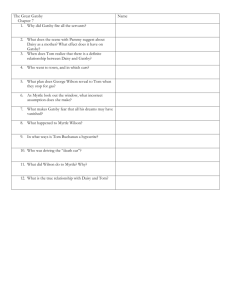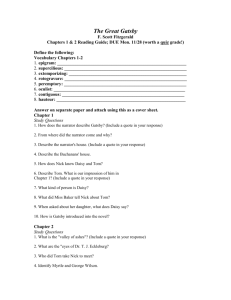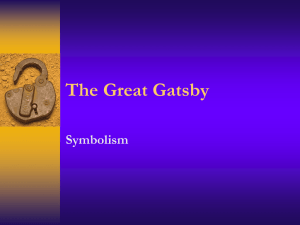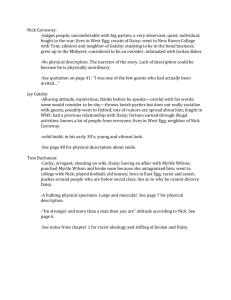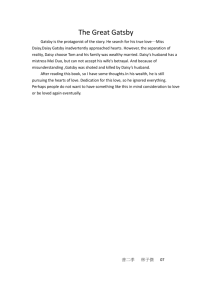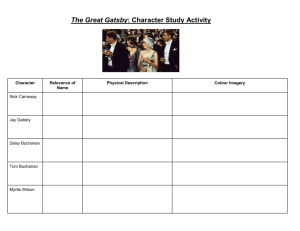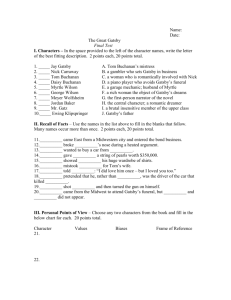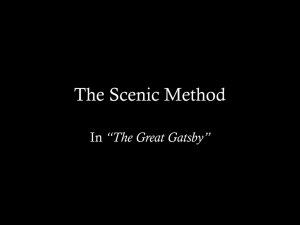Name **Note reference to page numbers in the text
advertisement
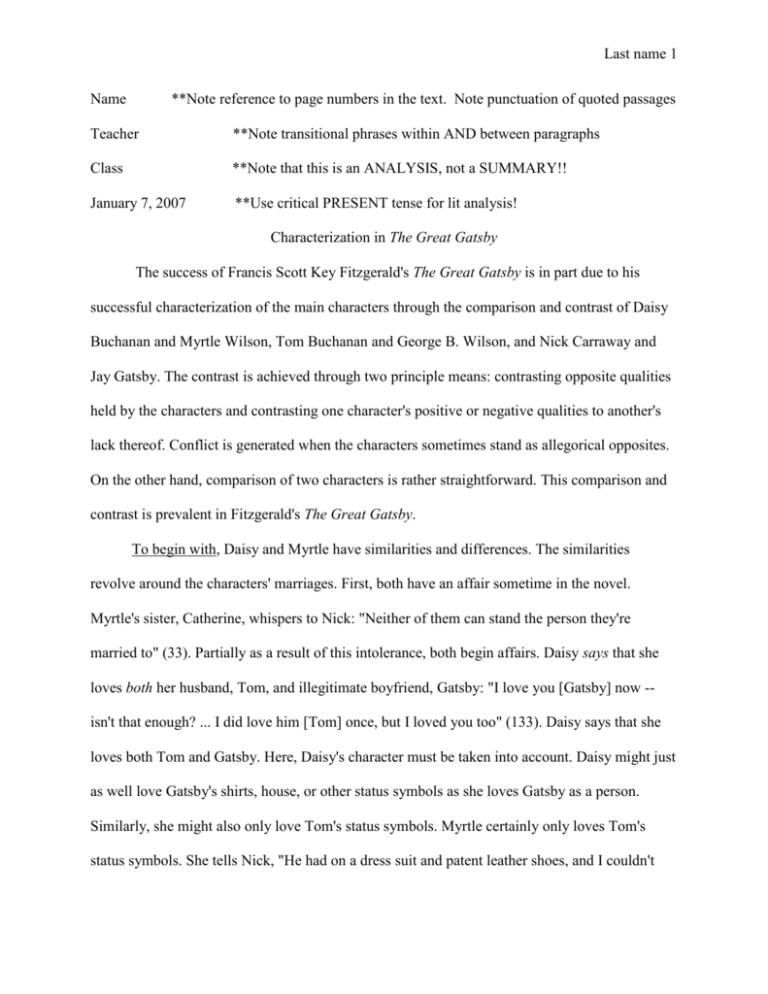
Last name 1 Name **Note reference to page numbers in the text. Note punctuation of quoted passages Teacher **Note transitional phrases within AND between paragraphs Class **Note that this is an ANALYSIS, not a SUMMARY!! January 7, 2007 **Use critical PRESENT tense for lit analysis! Characterization in The Great Gatsby The success of Francis Scott Key Fitzgerald's The Great Gatsby is in part due to his successful characterization of the main characters through the comparison and contrast of Daisy Buchanan and Myrtle Wilson, Tom Buchanan and George B. Wilson, and Nick Carraway and Jay Gatsby. The contrast is achieved through two principle means: contrasting opposite qualities held by the characters and contrasting one character's positive or negative qualities to another's lack thereof. Conflict is generated when the characters sometimes stand as allegorical opposites. On the other hand, comparison of two characters is rather straightforward. This comparison and contrast is prevalent in Fitzgerald's The Great Gatsby. To begin with, Daisy and Myrtle have similarities and differences. The similarities revolve around the characters' marriages. First, both have an affair sometime in the novel. Myrtle's sister, Catherine, whispers to Nick: "Neither of them can stand the person they're married to" (33). Partially as a result of this intolerance, both begin affairs. Daisy says that she loves both her husband, Tom, and illegitimate boyfriend, Gatsby: "I love you [Gatsby] now -isn't that enough? ... I did love him [Tom] once, but I loved you too" (133). Daisy says that she loves both Tom and Gatsby. Here, Daisy's character must be taken into account. Daisy might just as well love Gatsby's shirts, house, or other status symbols as she loves Gatsby as a person. Similarly, she might also only love Tom's status symbols. Myrtle certainly only loves Tom's status symbols. She tells Nick, "He had on a dress suit and patent leather shoes, and I couldn't Last name 2 keep my eyes off him..." (36). This is the point where the characters diverge. Myrtle has an affair to get away from her poor husband. Indeed, Myrtle feels that Wilson is too lowly for her. Again, she tells Nick, "I married him because I thought he was a gentleman. I thought he knew something about breeding, but he wasn't fit to lick my shoe" (35). While Myrtle married thinking her husband was a gentleman, Daisy married because she wanted to settle her life. The narrator explains, “She wanted her life shaped now, immediately -- and the decision must be made by some force ... that was close at hand. That force took shape ... with ... Tom Buchanan. ... Daisy was flattered (151-152). Daisy married more for convenience. Other than the affairs, differences in marriage can be found. For starters, Daisy is romantic. She once says, “...it's very romantic outdoors. There's a bird out there on the lawn that I think must be a nightingale come over on the Cunard (Line) or White Star Line. ... It's so romantic, isn't it, Tom?” (15). This is revealing of Daisy in that it shows her way of thinking. She sees a bird and instantly thinks of romantic things like cruise lines. Daisy's approval of the movie director and his star at Gatsby's party also shows her romantic side (106). Moreover, Daisy has an alluring quality in her voice. Nick comments, "It [Daisy's voice] was full of money -- that was the inexhaustible charm that rose and fell in it, the jingle in it, the cymbals' song in it..." (120). A further quality of Daisy is her gullibility. For example, Daisy tells Tom that she heard Tom is engaged. Even after Tom insists otherwise, Daisy counters, "But we heard it ... from three people, so it must be true" (20). This gullibility adds to her unique (at best) character. Lastly, Daisy lives in high-society. As the previous quotation about the White Star Line illustrates, Daisy thinks nothing of spending money. Myrtle contrasts to these qualities. Myrtle wants to live in high-society. Indeed, she attempts to act like a rich person, but she is only able to imitate vices. She is complimented on a dress and, trying to Last name 3 seem like a rich person, she retorts, "It's just a crazy old thing. I just slip it on when I don't care what I look like" (31). Myrtle only can want to have a wonderful voice, romantic qualities, good looks, money, and all that goes with it. In other words, Myrtle wants all that Daisy has. In short, Daisy Buchanan and Myrtle Wilson have both similarities and differences. While Daisy and Myrtle can be compared and contrasted, so can their husbands, Tom and George, respectively. About the only similarity is that both Tom and George are married to adulterers. The similarities end there. Tom has several qualities which can be contrasted. First, Tom is a racist. He tells Nick, “Civilization's going to pieces. I've gotten to be a terrible pessimist about things... The idea is if we don't look out the white race will be -- will be utterly submerged... It's up to us, who are the dominant race, to watch out or these other races will have control of things” (13)………………………….paragraph continues Lastly, Nick and Jay can also be contrasted. First, both share common habits and likes. For example, both have known and loved (loved, but in different ways) Daisy. Prior to Gatsby's death, both enjoy parties. Although neither drinks too often, both enjoy a cigarette occasionally (29, 50, 101). Moreover, both are careful individuals. Nick is told by Jordan Baker, "I hate careless people. That's why I like you" (59). Similarly, Jay is careful, but in a different way. Gatsby is careful in his speech (48). Next, Gatsby and Nick are different in their wealth. While Nick is from a rich family, Jay can only wish to be (2, 149). Such is why Gatsby invents rumors about his past -- because he truly had none (149). Fitzgerald only gradually gives details about Gatsby's past, about Oxford, the Great War, his family, Dan Cody. At the end, however, readers learn that Gatsby is living his dream, and that Nick really lacks a dream. However, with his shady business connections (74) and lawless methods of earning money, Gatsby's dream is corrupted (2). Nick, on the other hand, is a hard-working bond salesman on Wall Street (56). Last name 4 Nick is also extremely honest. As the narrator, he comments, "Every one suspects himself of at least one of the cardinal virtues, and this is mine: I am one of the few honest people that I have ever known" (60). Nick stands in opposition to Gatsby, the corrupt businessman. He also stands in opposition because Nick is a realist (111). A revealing scene occurs when discussing Gatsby's dream: I ventured, "You can't repeat the past." "Can't repeat the past?" he cried incredulously. "Why of course you can! "I'm going to fix everything just the way it was before," he said, nodding determinedly, "She'll see." (111). While Nick is a realist, Gatsby is a dreamer. Gatsby has one last element of characterization Nick does not have: Gatsby is shrouded in mystery. Lots of gossip is passed about Jay. One person says, "I'm scared of him. I wouldn't want him to get anything on me" (33). Other rumors such as his killing a man are also passed. In these ways, Gatsby and Nick are both similar. In conclusion, several characters stand in opposition to each other in Francis Scott Fitzgerald' The Great Gatsby. These people, however, also are similar. Much of the success of the novel may come from this successful characterization.

